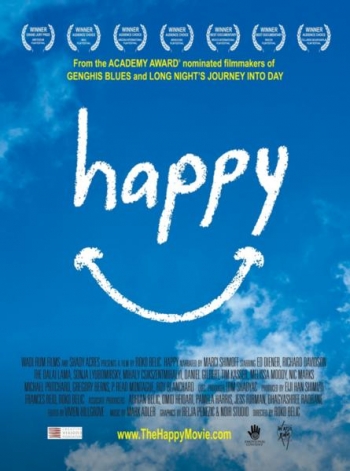“If you were the new leader of Hong Kong, what economic policies would you set up?”
Generally, my students stare at me with blank faces when I ask them questions in class. I don't blame them; after all, they spend most of their precious time at desks listening to rambling people like me. This time however, they were more than a little interested. And so was I for that matter. Because as it turns out, these young Hong Kongers want to limit the number of working hours so that they can see more of their overworked parents. Apparently they are not very happy with society’s habit of valuing money and economic growth over other more meaningful things.
And they are not the only ones that feel this way. That is why director Roko Belic has made a film, which is called, very simply, happy (2011). No nonsense in that title, the focus and value is clear: happy. It is also a bold title! Can a film that is little more than one hour long actually teach us about happiness? That state of being which most of us have been seeking for probably as long as we can remember?
In my opinion, the answer is yes. To begin with, the documentary is realistic. For example, it does not flatly state that money isn't important. The speakers are aware that it is not true that money doesn't buy happiness. As Daniel Gilbert, a Professor of Psychology explains, “when it enables us to meet our basic needs, money can give us a whole lot of happiness!” But he also knows that it is not true that money buys happiness, because once our basic needs are met, it makes no significant difference.
To explain this, the film depicts the lives and circumstances of many different people in different cultures, across the world. A rickshaw driver in India who lives in a very simple, small hut says that when he comes home to his son, he feels that he is the richest man in the world. Friendly neighbors surround him, and together they are like one big happy family. Compare this to the life of Hiroko Uchino in Japan, whose husband was rarely at home to spend time with his family, and literally worked himself to death in his factory job. The stress of his supervisor role led to sudden heart attack at work. Apparently this phenomenon is common enough in Japan that there is a statistical name for it: “karōshi ” – “death from overwork”.
The film seems to question why we allow this to happen. It points out the fact that science has long been preoccupied with depression and psychological illness, and somehow the idea of researching happiness is relatively new! Fortunately, it is a trend that is spreading fast, and there are now many people investigating the mental qualities of happiness. Acclaimed scientists, neurologists, monks and even the government of Bhutan understand the value of inquiry. Many of these people are featured in the film, lending variety and contrast to the findings of information.
In fact, this mixture of speakers and stories is an ideal way to communicate one of the main messages of the film: that there is no exact formula for happiness. To emphasize this, one man states, “it is not about giving up on the life you have lived, and starting anew. It is about finding what works for you.” For example, Andy Wimmer explains that he was born into very fortunate circumstances, and because of this, he views his life as a loan that can be paid back with interest. A former banker, he now lives in India and works in a shelter for the dying. He finds that spending his time looking after others is very fulfilling. In contrast to Andy, we are shown the life of a Brazilian man who finds happiness in living a simple life of surfing and feeling at one with nature.
Although the path of happiness is different for each of us, the film suggests that happiness is a skill to develop. The brain can be honed and trained like any other part of the body. And there are common ways of doing this. Across the world, the happiest people generally have a strong sense of community, they are helpful towards others and engage in meaningful relationships. The happiest people also tend to do activities that engage both body and mind. In so doing, it demands that they be more present in the moment. Throughout the documentary we are continuously reminded of these simple facts, whether it is through scientific research or witnessing someone's personal experience. So, although we are not given a miracle workout-routine for happiness, the film offers some very helpful and insightful tips for us to experiment with.
Weeks have passed since I first watched happy, and considered the lessons to fit into my lifestyle. Having viewed the film at a time when a few things were particularly stressful, I can truthfully admit that it taught me something about the pursuit of ‘happiness’. Not only is it possible to develop this skill, but seeing the film has actually made me feel, well, a little bit more happy (!)















